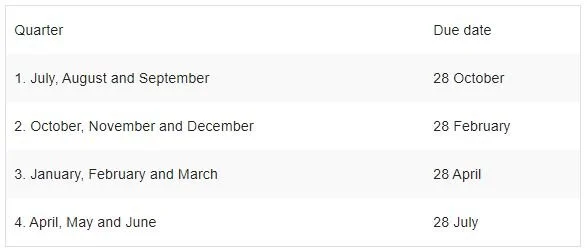April 28, 2021
The due date for lodging and paying is displayed on your business activity statement (BAS).
If the due date is on a weekend or public holiday, you have until the next business day to lodge and pay.
Your GST reporting and payment cycle will be one of the following.
Quarterly – if your GST turnover is less than $20 million – and we have not told you that you must report monthly.
Monthly – if your GST turnover is $20 million or more.
Annually – if you are voluntarily registered for GST and your GST turnover is under $75,000 ($150,000 for not-for-profit bodies).
A registered tax or BAS agent can help you lodge your activity statements.
You can set calendar reminders on your phone for lodgment key dates, by using the features in the ATO app.
In the event of a natural disaster you may have a different due date.
See also:
Quarterly reporting
If you lodge online, you may be eligible for an extra two weeks to lodge and pay your quarterly BAS.
Due date for each quarter
Whatever it is, the way you tell your story online can make all the difference.
A later lodgment and payment due date does not apply for quarter 2 because the due date already includes a one month extension.
Next steps:
See also:
Monthly reporting
The due date to lodge and pay your monthly BAS is the 21st day of the month following the end of the taxable period. For example, a July monthly BAS is due on 21 August.
If your GST turnover is $20 million or more, you must report and pay GST monthly and lodge your activity statements online.
Schools and associated bodies are automatically granted a deferral of their December activity statement. These will be issued with a deferred due date of 21 February.
See also:
Annual reporting
The due date to lodge and pay your annual GST return is 31 October.
If you aren’t required to lodge a tax return then the due date is 28 February following the annual tax period.
If you use a registered tax or BAS agent, different dates may apply.
See also:
Changing your reporting and payment cycle
Depending on your circumstances, you may be able to change how often you lodge and pay.
If you want to change your reporting and payment cycle early in the lodgment period (for example, in the first month of the quarter or at the beginning of the financial year) you can generally start the new cycle straight away. Otherwise, the new cycle will take effect from the start of the next quarter or year.


